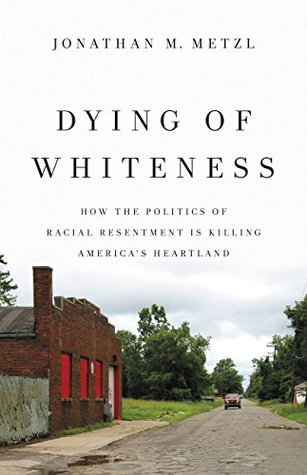More on this book
Community
Kindle Notes & Highlights
Read between
July 29 - August 1, 2020
White backlash politics gave certain white populations the sensation of winning, particularly by upending the gains of minorities and liberals; yet the victories came at a steep cost. When white backlash policies became laws, as in cutting away health care programs and infrastructure spending, blocking expansion of health care delivery systems, defunding opiate-addiction centers, spewing toxins into the air, or enabling guns in public spaces, the result was—and I say this with the support of statistics detailed in the chapters that follow—increasing rates of death.
Negroes must defend themselves even if it is necessary to resort to violence.” Violent white protests ensued after the Freedom Ride passed through Monroe, and Williams and his family fled to Cuba after being pursued by the FBI on fabricated kidnapping charges.
Huey Newton
(Wayne himself once said in an interview that “I believe in white supremacy until the blacks are educated to a point of responsibility.”)
Historian Michael Ralph describes Civil
Cost, in other words, functioned as a metaphor for concerns about a system that gravely threatened the sense of individualism underpinning particular white notions of health. This point is often overlooked by progressives who reflexively argue for government health care for all without taking account of the racial and historical intonations of federal health care networks in places like Tennessee.
But many white people continued to refuse to see. Tennessee refused to see the possibility and promise of change. Kentuckians, meanwhile, elected a governor whose primary message amounted to “If you are poor, I will take away your health care.” Americans elected Donald Trump on a platform that openly aimed to wipe out gains seen in states like Kentucky and bring everyone down onto the graphs of Tennessee. “Repeal it, replace it,” Trump shouted, “and get something great!”29
This leads to another tension driving American austerity politics: its connections to, and implications for, race and racism. A long literature details relationships between tax cuts, austerity, and race. In the US context, much of this work highlights how tax cuts disproportionately benefit rich white males at the expense of other groups of people in society. Tax cuts also lead to shortfalls in government services and programs that frequently assist women and minorities. Persons on government assistance, undocumented immigrants, and single mothers receiving child support are just a few of the
...more
and often middle- and lower-income white Kansans—who saw communal resources once spent bettering their lives now invested in the communal project of assuring upstream concentrations of wealth and downstream concentrations of despair.
As a thought exercise, we calculated what the health effects might have been had they approached even the worst post-Brownback year for white students—which, as it turned out, would have represented a dramatic improvement over the rates seen in black student populations.


